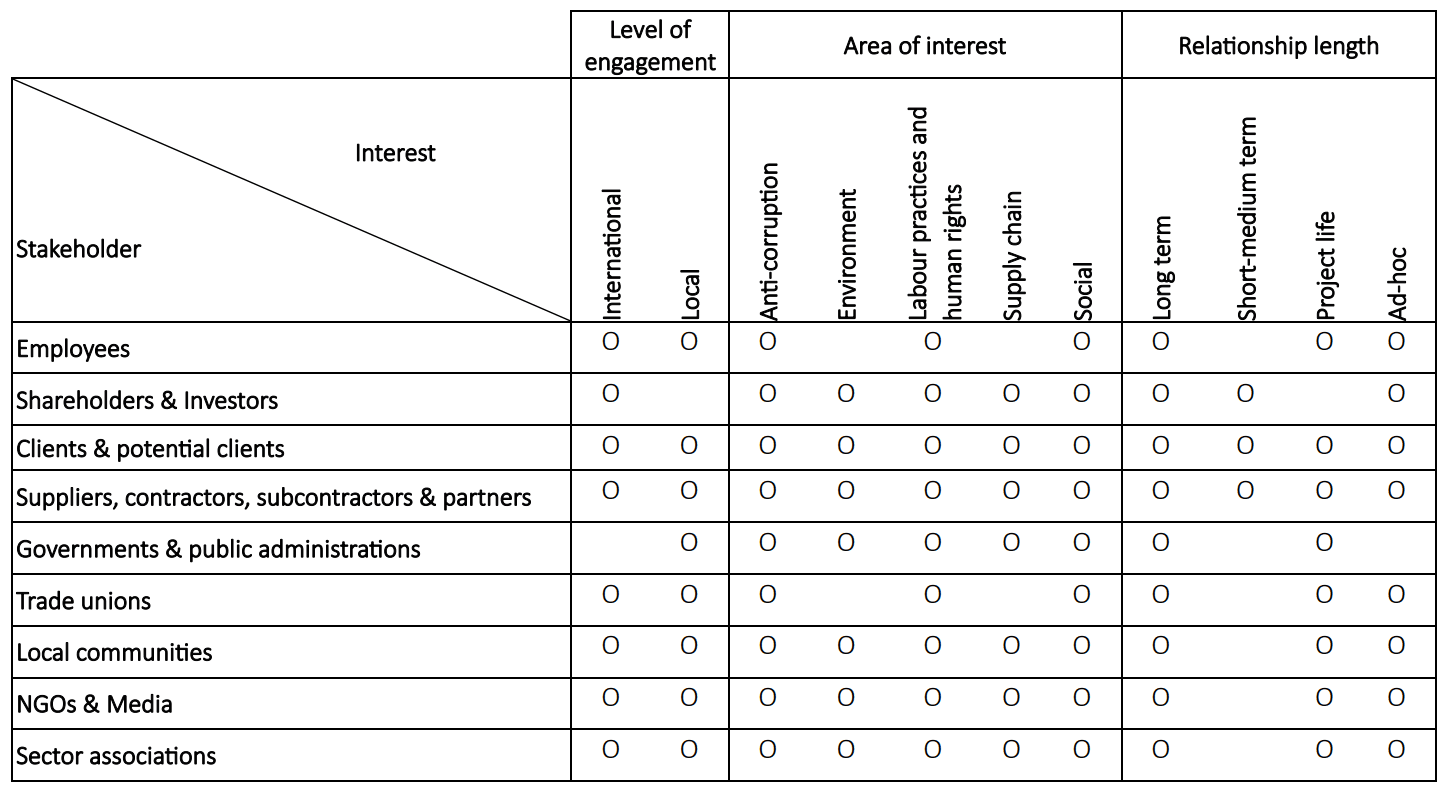Building a dialogue with our stakeholders

We believe that fairness and transparency in our relationships with stakeholders are essential to responsible business conduct. Given the unique nature of our business and our operations on an international scale, we manage thousands of interactions with our stakeholders every day. To ensure we are using the most effective channels for listening and to quickly address stakeholders' concerns, we regularly conduct a mapping and analysis of our key stakeholder categories. This process considers the level, frequency, and duration of interactions, key areas of interest, potential impacts, and the influence on decision-making processes, among other factors.
In response to the different characteristics and needs of stakeholders, the Group adopts diversified and flexible dialogue and engagement practices.

Our stakeholders
At the corporate level, key stakeholders include investors, customers, current and potential employees, national and international trade unions, suppliers and partners, public administrations, the media and the general public. Dialogue with them mainly concerns development objectives and strategies, results achieved, the acquisition of new projects, corporate governance, career paths and professional development.
- direct meetings with key customers and suppliers to ensure that the solutions proposed meet the needs defined in the contract;
- investor relations activities organised by the company or in response to specific requests from investors (current or potential);
- employee surveys on various topics and development and training programmes to involve them in the company's growth and continuous improvement process.
With regard to institutional relations and advocacy activities, the Company promotes dialogue with public institutions, regulatory bodies and other stakeholders in order to ensure legitimate representation and the sharing of issues of interest to the Group, such as infrastructure development plans, sustainable mobility, water and hydroelectric resource management, innovation for the development of efficient, resilient and environmentally friendly infrastructure, and the creation of jobs and value for the communities in which the Group operates.
At the operational level, the main engagement activities are linked to the specific characteristics of each individual project. Key stakeholders in this context include partners, employees, local communities, suppliers, contractors and subcontractors, customers, local authorities and organisations such as local trade unions and NGOs (non-governmental organisations). Webuild also believes that the environment – understood as the entire ecosystem in which it operates – should itself be considered a stakeholder.
The Group ensures maximum transparency in its communication with its internal and external stakeholders both in Italy and abroad, guaranteeing access to a continuous flow of information at a time of major investment in infrastructure, with an increasingly specialised audience. Dialogue and engagement with key stakeholders fall into the following categories:
- Corporate Communication - content and communication materials distributed through the Group's proprietary channels and through third-party channels (video productions, infographics and podcasts, press releases/press notes)
- Internal Communication - strengthening corporate identity and a single shared culture to respond to the company's significant growth - newsletters and demos; Expansion of the Employee Advocacy Brand Builders community
- Digital Communication - Company websites, magazines, webinars, surveys, social media
- Face-to-Face Communication - Meetings, presentations, focus groups, workshops, interviews, consultations, career days, public events
In addition, in 2024, to make the double materiality analysis process even more effective, workshops were held with groups of employees and suppliers, who were asked to validate the impact assessments within their remit that emerged from discussions with Subject Matter Experts and to specify their opinions on the matter.
With the tools and initiatives described above, Webuild is able to understand the main issues of interest to stakeholders and the impacts considered most relevant, thus making it possible to define: stakeholder engagement strategies in the territories where it operates, corporate reputation assessments, and risk assessment and monitoring activities. These processes are essential to ensure that stakeholder concerns are taken into account in the decision-making process.
Employees and Trade Unions
Our commitment
Skill development, health and safety protections, employee well-being, equal opportunities, industrial relations
Active communication channels
Intranet, regular meetings, internal training activities, surveys, evaluation processes, union meetings and campaigns
Areas of interest
Anti-corruption, social issues, employee protection, and human rights
Shareholders & Investor
Our commitment
Value creation, adherence to Corporate Governance standards, integrity, transparency, and accessibility of information
Active Communication Channels
press releases, reports and accounts, investor relations, stable relations with financial institutions and rating agencies, Shareholders’ meetings
Areas of Interest
Anti-corruption, environmental issues, employee protection and human rights, supply chain, social issues
Clients & Potential clients
Our commitment
excellence, innovation, quality of work, reliability, integrity, health and safety, environmental aspects, efficient supply chain management, information confidentiality
Communication channels in place
stable and continuing relationships with clients, in all the life cycle of the projects
Areas of Interest
Anti-corruption, environmental responsibility, employee protection and human rights, supply chain, social issues
Suppliers, Contractors, Subcontractors, and Business Partners
Our commitment
reliability, integrity, efficiency, objectivity in the evaluation process, information confidentiality
Communication channels in place
selection processes, regular meetings, training activities, feedback systems, stable relationships with partner firms
Areas of Interest
Anti-corruption, environmental responsibility, employee protection and human rights, supply chain, social issues
Governments & Public Administrations
Our commitment
Legality, business integrity, reliability, transparency
Active Communication Channels
Ongoing institutional relations with local institutions in host countries
Areas of Interest
Anti-corruption, environmental responsibility, employee protection and human rights, supply chain, social issues
Local communities & NGOs
Our commitment
Job creation, professional development, use of local suppliers, social support initiatives development, open dialogue with territories
Communication channels in place
Meetings with community representatives, specific communications campaigns, processes of personnel’s selection and suppliers’ evaluation, sponsorships and social support initiatives
Areas of Interest
Anti-corruption, environmental responsibility, employee protection and human rights, supply chain, social issues
Trade Associations & Media
Our commitment
cooperation, capacity building, transparency, promptness of the information
Communication channels in place
participation in trade association activities, systematic press review activities, organisation of events, press releases, website
Areas of Interest
Anti-corruption, environmental responsibility, employee protection and human rights, supply chain, social issues
Materiality matrix
The most relevant topics for us and for our stakeholders.
Materiality Matrix
We adopt diverse and flexible dialogue and engagement practices to respond to the varying characteristics and needs of our stakeholders.
At the corporate level, key stakeholders include investors, clients, current and potential employees, national and international unions, suppliers and partners, public authorities, the media, and the general public. For these stakeholder categories, the dialogue primarily focuses on development goals and strategies, achieved results, acquisition of new projects, corporate structure, and career paths and professional development.
At the operational level, the main engagement activities are tailored to the characteristics of each project. Key stakeholders in this context include partners, employees, local communities, suppliers, contractors and subcontractors, clients, local authorities, and organizations such as local unions and NGOs (Non-Governmental Organizations). Additionally, we believe that the environment—understood as the entire ecosystem in which we operate—should also be considered a stakeholder in its own right.
A list of the material topics grouped by the three ESG clusters is provided below.
SOCIAL
A. Occupational health and safety
B. Human rights
C. Diversity and inclusion
D. Attraction, management and development of employees
E. Contribution to local economies
F. Supply chain
G. Stakeholder engagement
ENVIRONMENT
H. Climate change
I. Natural resources and circular economy
J. Biodiversity
GOVERNANCE
K. Ethics and integrity
L. Excellence and innovation
M. Anti-corruption
N. Cyber security
O. Finance for sustainable growth
The analysis showed that the impacts related to the topics of “Occupational health and safety”, “Diversity and inclusion”, “Supply chain” and “Excellence and innovation” were allocated greater priority.